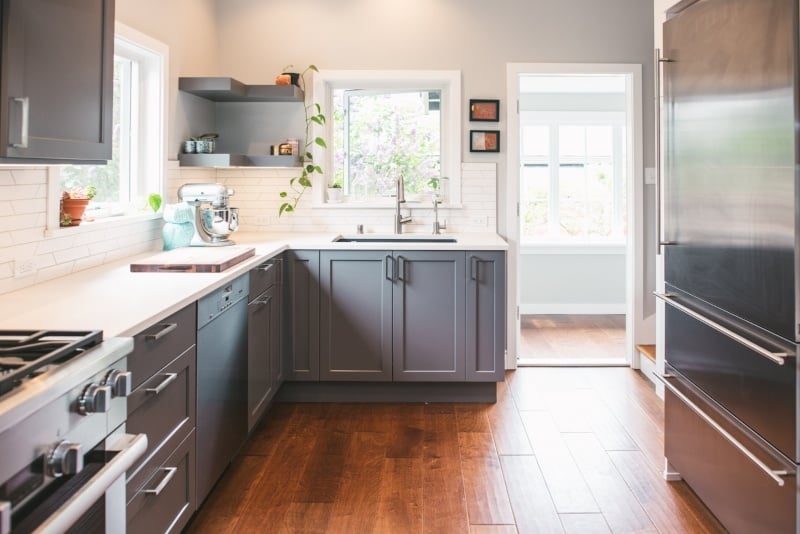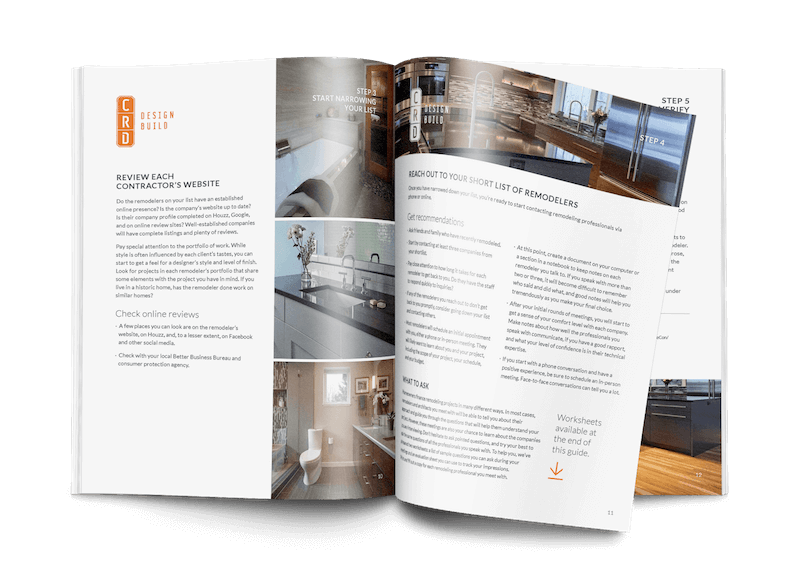
If you are a Seattle homeowner contemplating a kitchen remodel, you may be wondering if you will need to permit your project. In most cases, the answer is yes.
A good rule of thumb to determine whether you will need permits for a kitchen remodel is whether you will be touching anything behind the walls or in the floor. You'll also most likely need a permit if you are removing or adding walls.
For all but the most cosmetic upgrades, you will likely need a permit. In fact, you may need three permits.
Before going any further, I need to mention that you should always check with the Seattle Department of Planning and Development before you start any remodeling project, even if you are just planning a relatively cosmetic kitchen upgrade.
For projects under $6,000 you may not need a permit
Most building project in Seattle require a permit, but there are some exceptions for very minor repairs and projects. According to the city of Seattle:
You don't need a permit for minor repairs or alterations that cost $6,000 or less in any 6-month period. The $6,000 limit is based on fair market value of labor and parts, even if you do the work yourself.
But even a project that costs less than $6,000 can still require a permit:
You need a permit for any work on load-bearing supports, changes to the building envelope, and work that reduces egress, light, ventilation, or fire resistance no matter how small the project.
See also: Pros & Cons: 11 Countertop Materials Compared
An example of a kitchen remodel that may not require a permit
If you are just refacing your cabinets and replacing your sink, faucet, and a couple of pendant lights, and the total cost of the project is under $6,000 (including the value of your labor), you might find that you don't need a permit. This is especially true if your new plumbing and electrical fixtures, like your sink and lights, are connecting right to the existing lines and junction boxes, and you aren't moving or adding any electrical outlets.
All major kitchen remodels must be permitted
In almost every circumstance, doing a full remodel of your Seattle kitchen will require permits and a full series of inspections. Notice that "permits" is plural.
Required Permits for a Kitchen Remodel in Seattle
- Plumbing permit
- Electrical permit
- Building permit
Let's take a closer look at each of these.
Plumbing Permit (~$300)
Sure, you might be able to get away with not having a plumbing permit if you are just upgrading your faucet and dishwasher with new ones, but you definitely need one for the type of plumbing work that takes place in a major kitchen remodel. Moving your sink from one location to another, adding plumbing for an ice maker, and adding a dishwasher are all examples of projects that would require a plumbing permit. Another upgrade that would require a plumbing permit is to switch from galvanized pipes to copper or PEX. Messing with any plumbing behind the walls is going to require a permit.
Electrical Permit (~$300)
You might find that there is a little room for interpretation when it comes to needing a plumbing permit, but this isn't the case with electrical permits. And that's for your own safety. After all, would you really want to risk letting an unqualified person do uninspected electrical work in a wet kitchen environment? It would just be an invitation for fire, electrocution, fines, and more problems. That said, you can swap out lighting fixtures and electrical outlets if it's to an existing outlet box (but you can't put a grounded outlet in an ungrounded box). A few things that are strictly forbidden without an electrical permit are moving electrical outlets and rerouting wires. To keep your family safe, you should hire a licensed electrician to install grounded GFI outlets (the kind that pop off in an instant if they sense a short).
Building Permit (~$800, depending on the value of your project)
If your project requires an electrical or plumbing permit, it's likely going to trigger the need for a building permit as well. A major kitchen remodel will require you to open up walls, remove old fixtures, flooring, and tile. And this type of work requires a building permit. Luckily, you can usually just get a STFI (subject to field inspection) permit for a kitchen remodel. Seattle issues about 17,000 of these a year. You can find tips about these permits and the fee schedule here. Basically, Seattle will issue these for relatively simple projects that don't require a full plan review. You can walk up to the counter, request the permit, and walk out with it the same day.
See also: How to Pick Kitchen Appliances for Your Remodel
Inspections
Included in your permit fee are inspections. The city will send its inspectors to check on the work being done. Electrical, plumbing, and building inspectors will make sure everything is completed to code. If you received a STFI building permit (see above), it will be up to the inspector to make sure you're meeting current building codes rather than an office worker closely reviewing your plans before they get built. This can be a big time-saver, but it means the contractors you work with need to be well-versed on building codes, or you could have to spend extra to do the work over.
If you've hired a general contractor, he or she will schedule visits by the three inspectors once all the wiring and plumbing are in place but before the walls are closed up. You will need another round of inspections when your project is complete. Before the building inspector gives final approval, he or she will check for things like insulation on exterior walls being installed correctly and make sure the plumbing and electrical inspectors have signed off. If all goes well, you will know you have a safe and well-built new kitchen that is code-compliant.
See also: How to Survive a Kitchen Remodel
Avoid the unlicensed handyman trap
Because the cost of remodeling your kitchen can be high in per-square-foot terms, some homeowners are tempted to do the work themselves or hire a handyman. DIY is great, if you have the skills and the time. You do still need permits, however.
Hiring a handyman can work well if he or she is skilled and is licensed as a contractor. If you're just doing a little cosmetic face lift, like painting your walls and cabinets or replacing your faucet and appliances, a handyman might be a fine choice, although the work might look like it was done by a handyman rather than a professional carpenter and qualified subcontractors. The real risk is when a handyman acts as a general contractor but offers to save you money by doing the work on the sly, without permits. It's very unlikely (and certainly not desirable) that you could do a full kitchen remodel without upgrading the wiring, for instance. And if a handyman offers to put in new outlets or open up the walls without the proper permits, it's illegal, plain and simple. If you proceed with un-permitted work, you will be opening yourself up to risks. Here's what Zillow writes on the topic:
If a permit is needed and you fail to get one, the city may discover this at some time in the future and getting a permit retroactively can frequently be significantly more expensive and much more problematic than having obtained the permit before work commenced. If work is not done in accordance with city procedures or if the inspector is unable to determine if the work has been done properly, the homeowner could be required to open walls, tear up floors, so that the inspection may take place. In addition, by law, work not permitted where a permit was required must be disclosed to any prospective purchaser. This may cause the owner to discount their sale price or perform costly or time-consuming repairs before title can be transferred. Read full article
One more reason to avoid the un-permitted route is that no reputable electrician or plumber will want to work on an illegal job. It's common for Seattle building inspectors to be on the lookout for work trucks pulled up in front of houses and knock on the door to make sure the owner or contractor has the proper permits. You can be fined $500 a day; subcontractors face even steeper fines and could lose their license after just a few violations. It's little wonder the good ones choose to avoid that risk.
See also: Customized Kitchen Appliances
Hire a reputable contractor and get permits
Luckily, following the rules and avoiding fines (or worse) is simple. A reputable remodeling contractor or design-build firm will likely take care of all the details and pull the required permits for you. Working with a reputable company may cost a little more in the short term, but it will pay off in the long term and greatly reduce your risk. And if you want to reduce the cost per square foot of your kitchen remodel, here's a tip: combine it with other projects in your house, like a bathroom or basement remodel. You'll have a parade of subcontractors and inspectors coming through your door, and it's far more cost effective to have them addressing multiple areas of your home at once.
If you have questions about permitting or anything else related to your kitchen remodeling project, we'd be happy to help. Feel free to contact us online or give us a call at 206-782-6959.
Guide to Hiring a Remodeler
This comprehensive guide walks you through all the steps of choosing who will design and build your project, vetting remodeling companies, and ensuring that you have the best experience.



